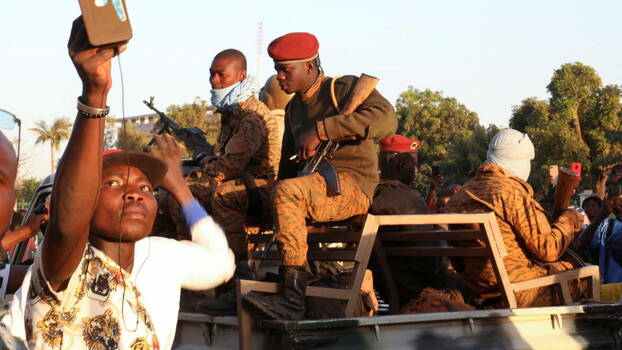
Burkina Faso is hardly on the radar of German political, military, or civil society actors as a country experiencing a serious crisis of insecurity, conflicts, and violence. Yet it has witnessed increasing security threats by various armed groups since the last couple of years, with severe impacts on social, cultural, and economic rights, civil liberties, and political participation.
Bettina Engels teaches political science with a focus on conflict and African Studies at the Department of Political and Social Sciences at the Freie Universität Berlin. She is an editor of the Review of African Political Economy, the Canadian Journal of Development Studies, and the Handbook of Critical Agrarian Studies.
Since 2017, more than 120 attacks on schools have been reported — half of them in 2019 alone. 2,500 schools have been closed due to the security situation, with catastrophic consequences for access to education. Moreover, more than one million people are internally displaced. Thousand are seeking refuge in neighbouring Mali, another crisis-ridden country. Most of the attacks have taken aim at institutions of the state, while increasingly targeting leaders of schools, churches, and religions.
More than 2,200 people died in 2019 and 2020 from social unrest related to the conflicts, including civilians and members of state security forces and non-state armed groups—a terrifying increase as compared to about 300 fatalities in 2018.
The vast majority of these occurred in the Northern Sahel region, but the attacks have gradually spread to several other regions, especially to the East of the country. In addition, criminal attacks in the capital city of Ouagadougou have increased, especially in 2020, and human rights violations by state and non-state armed groups, including vigilante groups and state-sponsored civil militias, are alarming.
The recent creation of a transnational “anti-terror” military operation, the G5 Sahel Joint Military Force, has not yet succeeded in improving the security situation; neither did the French military intervention “Opération Barkhane”. The latter, quite the contrary, led to intensified anti-French resentments in the region. Many observers noted that the military interventions destabilize rather than stabilize the security situation in Burkina Faso.
Yet economic growth in Burkina Faso has consolidated during the last years, and some indicators of human development have slightly improved. More importantly, the country is characterized by a vibrant civil society, a highly motivated young generation, and a still relatively strong cultural and social cohesion and striving for solidarity and “national unity”. After long-standing President Blaise Compaoré and his semi-authoritarian regime were successfully overthrown by a popular insurrection in October 2014, aspirations for a substantial political and social change could so far not be achieved. For instance, with regard to poverty, access to education, health care, water and sanitation, Burkina Faso is ranked at the bottom of the Human Development Index.
Additionally, according to the national anti-corruption network Réseau national de lutte anti-corruption, or REN -LAC, the majority of the population consider politics and administration in Burkina Faso fundamentally corrupt. In a 2019 study, REN-LAC reported that 30.3 percent of respondents stated having been subjected to, or witness of, corruption. Most frequently, corruption is reported with respect to the municipal police, to customs, and to the national police. Because the physical and institutional infrastructure in Burkina Faso is weak, the economy is characterized by low diversification, particularly high dependency on imported food and fuel, and resource exportation (namely, gold and cotton), making it highly exposed to fluctuation of its world market prices.
This paper seeks to explore the perspectives of actors affected by the current security crisis in Burkina Faso and by development and humanitarian interventions. Views on the causes and impacts of the crisis in general, and on military and civilian interventions in particular, are summarized. The matter is not to present a comprehensive and representative picture of the range of existing perspectives, but to provide insights on some positions that seem important for solidary and internationalist actors abroad to reflect and discuss on the positions and actions they may take towards the recent crisis, conflicts, and military-civilian interventions in Burkina Faso.